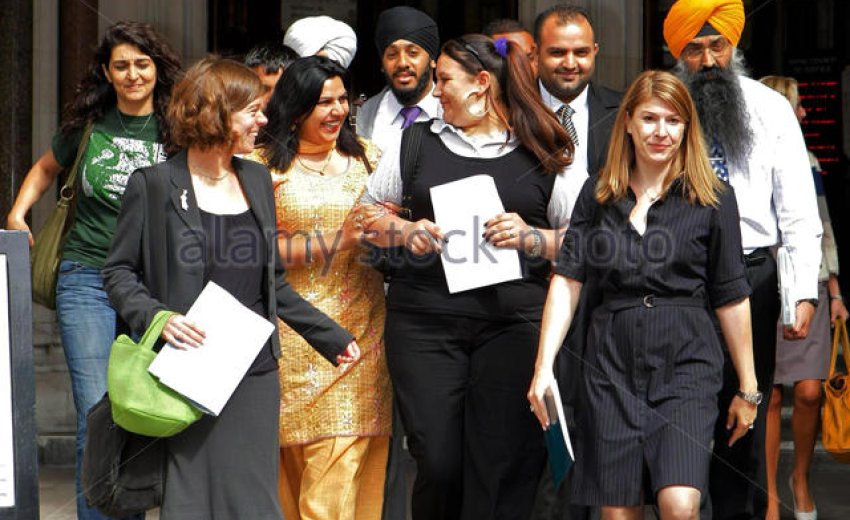 Saturday August 2, 2008 - When I first heard about the Welsh Sikh girl excluded from her school for wearing a kara (steel bangle), I didn't think too much of it. Religious people place far too much emphasis on symbols as it is. But reading more about the case has got me convinced that the court made the right decision to allow her to wear it. I realise I'm not going to win any popularity contests with this stance but bear with me.
Saturday August 2, 2008 - When I first heard about the Welsh Sikh girl excluded from her school for wearing a kara (steel bangle), I didn't think too much of it. Religious people place far too much emphasis on symbols as it is. But reading more about the case has got me convinced that the court made the right decision to allow her to wear it. I realise I'm not going to win any popularity contests with this stance but bear with me.
Perhaps the most bizarre circumstances were the ones imposed on Sarika Watkins-Singh by her school:
She spent nine weeks in isolation in a classroom, alone except for a teaching assistant, working from notes which she was instructed to copy. The school canteen was barred to her and so were its corridors whenever they were being used by other pupils. She was not allowed to join her friends in the playground and had to be accompanied by a teacher when she went to the toilet.
Did the school really have to go that far? And this is the central point to this case – about fairness and appropriate responses. Put aside your prejudice for or against religion for a second. The question is: do we not want a legal and political system that is flexible enough to accommodate differences in certain cases? Don't we want to live in a liberal, pluralistic society that accepts difference and in some cases makes exceptions (whether that be for atheists who don't want to sing hymns or the faithful who want to adorn themselves with some symbols)? Your answer may still be no.
But consider this. The most interesting aspect to this whole case was the fact that the judge took advice on whether the kara was a central tenet to the Sikh faith (it is). And while some might find that potentially dangerous and bizarre, I believe this to be a good development. It means that while people do have some leeway on religious matters, they have to be in proportion. In other words, you can't take the piss and claim your religion sanctions it. For this reason I believe rejecting the claims by Shabina Begum and Lydia Playfoot were the right decisions to make. The line has to be drawn somewhere and religious people cannot get away with anything just on the basis of belief.
The second important point to note in these cases is that the law is a very blunt instrument. The case went to court but I'm glad there isn't a specific law that bans or fully allows such symbols. It's a very British position to take, admittedly, but these decisions must be devolved to local authorities and schools. For example, if the kara was being used as a weapon by Sikh gangs (as used to be the case in West London), then I'd fully support the decision by a school to ban it locally. The local context is important.
This legal grey area might annoy those who want a complete ban or a law allowing religious symbols, but that would be counter-productive and a bad case of nanny-statism.
That said, I bet I still haven't convinced a significant minority of readers. As Brett Lock of the National Secular Society said when I debated him on More4 News on Tuesday evening, where do you draw the line? Where does it stop?
The problem here is that many see this as a zero-sum game: ie, if you give an inch to the religious then the non-religious lose out. In certain cases this may well be true. But it wasn't in this case. And that is important because we should judge each case on its own merit.
In many ways this argument by the NSS reminds me of the traditional riposte that many homophobes use against gay marriage. "What next? Allowing people to marry animals? Marriage is between a man and a woman," they scream hysterically. The line may be fuzzy but as each case has shown the law has roughly come out on the side of fairness and proportionality. It works. And the faithful may not even like it, in the case of Shabina Begum for example, but it is entirely right that some governing body decides whether a student is taking the mickey or not. An absolute rule would be counter-productive.
Anyway, my point is that there's no need to view this as a zero-sum game. Decades ago, Sikhs won an exemption from wearing motorcycle helmets because they wear turbans and they haven't harmed anyone apart from possibly themselves. And because there wasn't such public animosity towards religion then, there wasn't the accompanying hysterical response.
Even critics of this outcome should recognise that the law already differentiates between different contexts in any case. From domestic violence to murder and even disability rights, we all recognise that not only does proportion and fairness matter, but it is central to the legal system. Otherwise there would be a law stating that any murder of a person would carry a sentence of 20 years regardless of whether it was unintentional, in self-defence or a contract killing.
Sarika's ruling was, in this case, fair. And that is really all that matters for now. Until the next case.
- By Sunny Hundal - guardian.co.uk
